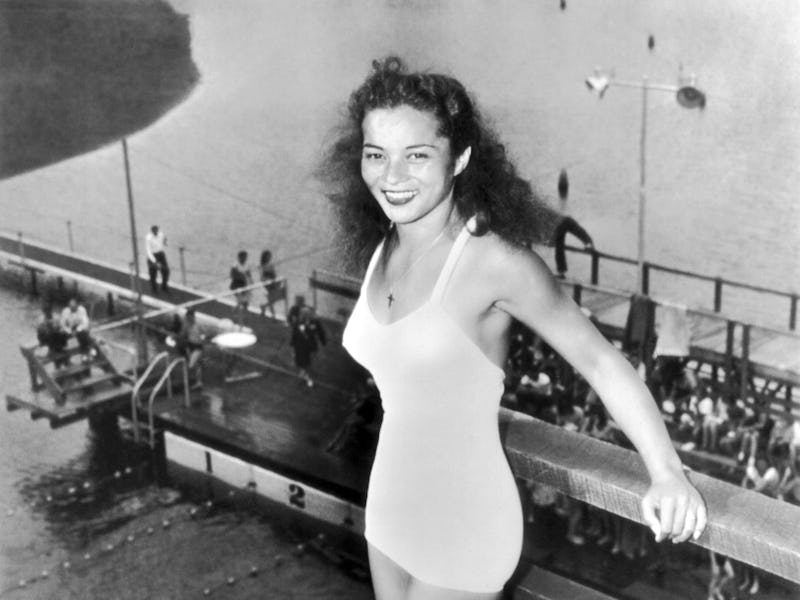Why Vicki Draves' story is so powerful, 72 years later

Vicki Draves, the first Asian-American woman to win an Olympic gold medal, suffered a daily indignity in pursuit of her athletic achievements.
In 1940s San Francisco, where she grew up, public pools were limited to "whites only" — except for one day a month, when people of color were allowed to swim. The pools would be drained and cleaned the next day.
It was in these segregated pools that Vicki Draves would perfect her form. It was there where she would grow as a swimmer, learning and getting faster, fast enough to qualify for the U.S. women's diving team at the 1948 Summer Olympics in London.
On this day 72 years ago, Draves dove into history, becoming the first Asian-American woman to win Olympic gold.
It is recognition of this momentous occasion that Google celebrated Draves today — August 3, 2020 — with a Google Doodle, one of the modern world's more interesting plaudits.
Google's Google Doodle tribute to Vicki Draves, celebrated American Olympian.
Who was Vicki Draves?
Vicki Draves was born Victoria Taylor Manalo, the child of a Filipino father and an English mother, on December 31, 1924. Even before she was born, racism loomed over her life.
While Manalo-Draves' parents' interracial marriage was "legal" — in a now-overturned California law from 1880, it was prohibited for whites to marry minority ethnic groups, including "Mongolians," but American law could not determine if Filipinos counted — their union was socially frowned upon.
Manalo's aunt, also an English woman who married a Filipino man, refused to cave in to pressure to divorce her husband and was consequently killed in an elevator "accident." A longtime family friend said in 2015, "I think that changed the dynamic of her childhood and from then on she was taught to look down and to avoid the glares of other people.”
Raised in the SoMa district of San Francisco, a young Manalo wanted to learn ballet. Unable to afford lessons, she took up swimming instead at the saltwater Fleischhacker Pool, where Manalo learned from the Mission Red Cross.
While attending Commerce High School, Manalo was discovered by Phil Patterson, coach of the Fairmont Hotel Swimming and Diving Club. Patterson invited her to join, but she couldn't do so unless Manalo went by her mother's maiden name, Taylor, due to discrimination and feverish anti-Asian sentiment in the midst of World War II.
Vicki Draves, at the 1948 Summer Olypmics in London.
"Because of my racial background, he could not bring me as a member of the Fairmont Hotel Swimming and Diving Club," recalled Manalo-Draves in 1999. This inspired Patterson to start a "special club" in order to bypass the Fairmont's rules.
"I didn't feel great about it because there was this distinction again. I thought that if that was the only way I could start, I would have to accept it. [Patterson] even asked my mother if I could use her maiden name instead of my Filipino name, which was Manalo. I don't know how my dad ever felt because he never said anything."
In 1943, at age 19, the future Olympian met Lyle Draves (through her friendship with another historic Olympian, Sammy Lee), coach at the Athens Athletic Club in Oakland. Draves began training Manalo, which led to her five United States diving championships. The two married in 1946, where Manalo took the name Draves.
"Lyle was very precise on the fundamentals of board work," Draves recalled on her husband's first lessons to her. "We finally decided that he would teach me as if I had never dived before. It was hard, especially after having performed all of the dives in national competition. Here I am being treated like a novice. I realized how much I didn’t know and why I was doing what I was doing."
In 1948, Draves competed at the Summer Olympics in London, representing the United States. She won a record two gold medals, in both platform and springboard diving.
"I was thinking, 'Please, God, help me,'" recalled Draves on her final, medal-winning plunge. "I remember sitting by Sammy, and I was so nervous that I would shake between each dive, as though I was cold. I remember saying to Sammy, 'I can’t do this Sammy. I am not going to make it.' He said, 'You came all this distance and you are going to give up? Get up there and do what you are supposed to do.' I got up there ... and I tell you it was like somebody else did that dive for me. I sort of sailed through it, and I knew I hit it when I was underwater and I thought, 'Oh boy, thank you, God.' It was sort of euphoric, I guess. I didn’t know where it came from."
Draves was awarded gold for her performance, becoming the first Asian-American woman to win the top prize at the Olympic games. Draves was inducted to the International Swimming Hall of Fame in 1969, and in 2005, the site of Vicki's and her twin sister Connie's elementary school became the Victoria Manalo Draves Park. Draves died in 2010, and was survived by her husband Lyle, sister Connie, and her sons David Jeff, Dale, and Kim.